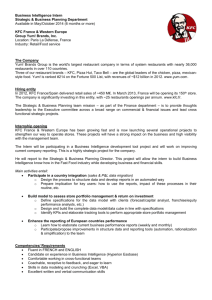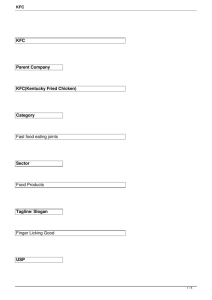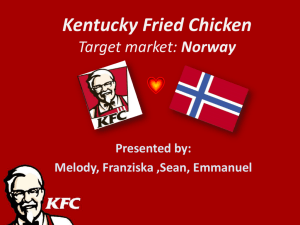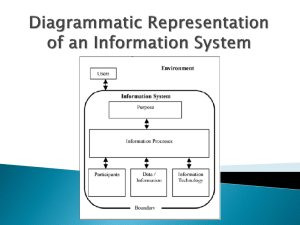SWOT Analysis: Market
advertisement
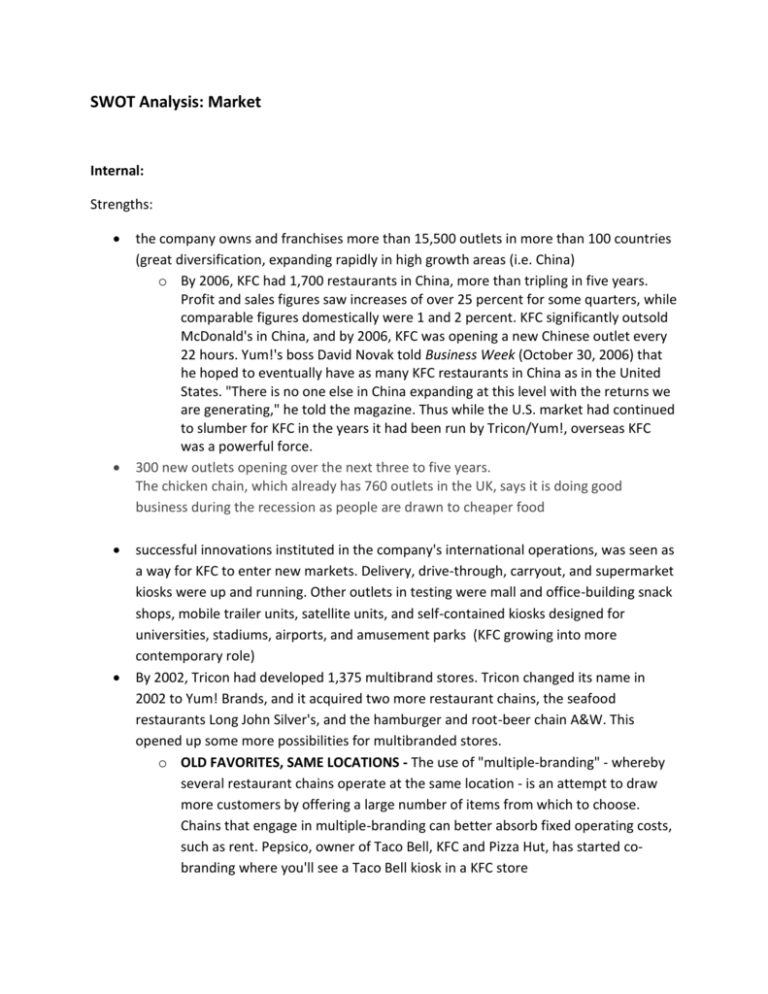
SWOT Analysis: Market Internal: Strengths: the company owns and franchises more than 15,500 outlets in more than 100 countries (great diversification, expanding rapidly in high growth areas (i.e. China) o By 2006, KFC had 1,700 restaurants in China, more than tripling in five years. Profit and sales figures saw increases of over 25 percent for some quarters, while comparable figures domestically were 1 and 2 percent. KFC significantly outsold McDonald's in China, and by 2006, KFC was opening a new Chinese outlet every 22 hours. Yum!'s boss David Novak told Business Week (October 30, 2006) that he hoped to eventually have as many KFC restaurants in China as in the United States. "There is no one else in China expanding at this level with the returns we are generating," he told the magazine. Thus while the U.S. market had continued to slumber for KFC in the years it had been run by Tricon/Yum!, overseas KFC was a powerful force. 300 new outlets opening over the next three to five years. The chicken chain, which already has 760 outlets in the UK, says it is doing good business during the recession as people are drawn to cheaper food successful innovations instituted in the company's international operations, was seen as a way for KFC to enter new markets. Delivery, drive-through, carryout, and supermarket kiosks were up and running. Other outlets in testing were mall and office-building snack shops, mobile trailer units, satellite units, and self-contained kiosks designed for universities, stadiums, airports, and amusement parks (KFC growing into more contemporary role) By 2002, Tricon had developed 1,375 multibrand stores. Tricon changed its name in 2002 to Yum! Brands, and it acquired two more restaurant chains, the seafood restaurants Long John Silver's, and the hamburger and root-beer chain A&W. This opened up some more possibilities for multibranded stores. o OLD FAVORITES, SAME LOCATIONS - The use of "multiple-branding" - whereby several restaurant chains operate at the same location - is an attempt to draw more customers by offering a large number of items from which to choose. Chains that engage in multiple-branding can better absorb fixed operating costs, such as rent. Pepsico, owner of Taco Bell, KFC and Pizza Hut, has started cobranding where you'll see a Taco Bell kiosk in a KFC store Weaknesses: Company not seeing Return on Assets with significant diversification into new product lines to capture new markets (drain of capital expenditure was not worth it) From YUM Brand Website: (Investor Relations) o 75% of consumers eat less fried chicken due to health concerns o 22% of consumers eat less KFC because they consider us too expensive o 50% of consumers say that KFC is not on- the- go External: Opportunities: The world economy will grow 3.1% in 2010, the IMF forecast in October, but the emerging market economies are expected to expand at a 5% rate. Diet foods don't work in the quick-service, or fast food, industry (Survey)-Majority of KFC’s menu is very unhealthy o Value price meals are in,,,”more bang for your buck” (could see more value price meals/combos in the future for KFC) LARGER PORTIONS DO WORK – cost more but taste about the same as the regular models in an effort to attract more adults (survey) –another trend KFC could captailize on in gaining market share OLD FAVORITES, NEW LOCATIONS - This trend will continue as increased competition and saturated markets cause fast food companies to become more creative in selecting their locations. (i.e. KFC’s moving into various big box retail stores) –KFC has been doing this to some degree, move into more various business, (i.e. Rona, Lowes’, Sport stadiums, etc.) Consumers in emerging markets demonstrate a greater propensity than those in developed markets to believe that international brands are of better quality than local brands, with only 30 percent of developing market respondents indicating that local brands are just as good as those internationally manufactured,” Emerging Market Context: KFC is considered the superior fast food chain among consumers in Egypt, South Africa and Asia “Global brands have a strong functional foundation, as well as established marketing programmes, and local manufacturers may have a battle on their hands to catch up with the perceived quality of large global products (Americans) 18-29 year age segment lead in fast food eating at least once per week, almost 60% of this age group (U.S. market research survey) (Americans) 73% of Americans say they eat junk food because it is due to convenience (more locations, easier for consumers to access) (U.S.Market research Survey) The commodity analysis hold rating indicates that chicken should stay the same price over the short term Threats: overall, fast-food chicken was no longer an expanding area, and at home (North America), KFC was stuck in flat or 2 to 3 percent sales growth While the financial services industries are fairly robust in many emerging market economies, bankers remain reluctant to lend (recent economic recession, financial industry hurting) Emerging Market Context: “However, this doesn’t necessarily translate into purchasing behaviour, as almost 60 percent of these same consumers said they are more likely to buy a local brand over an international product if both are of equal price Not surprisingly, global fast food giant McDonald’s was seen as the preferred quick serve restaurant by most consumers surveyed in emerging markets High employee turnover in fast food business, Sometimes as much as 200%, these employees are the backbone of these companies, and with this amount of turnover, very costly to franchisee and/or companies to consistently retrain - High turnover due to many students working there for part time work , also very low pay Minimum wage is constantly increasing, especially in develop countries, hurts the bottom line (Americans) 66% of adults eat out once per week, however only 41% of adults eat fast food once per week (u.s. market research survey) chicken feed cost is substantial and can fluctuate over type
